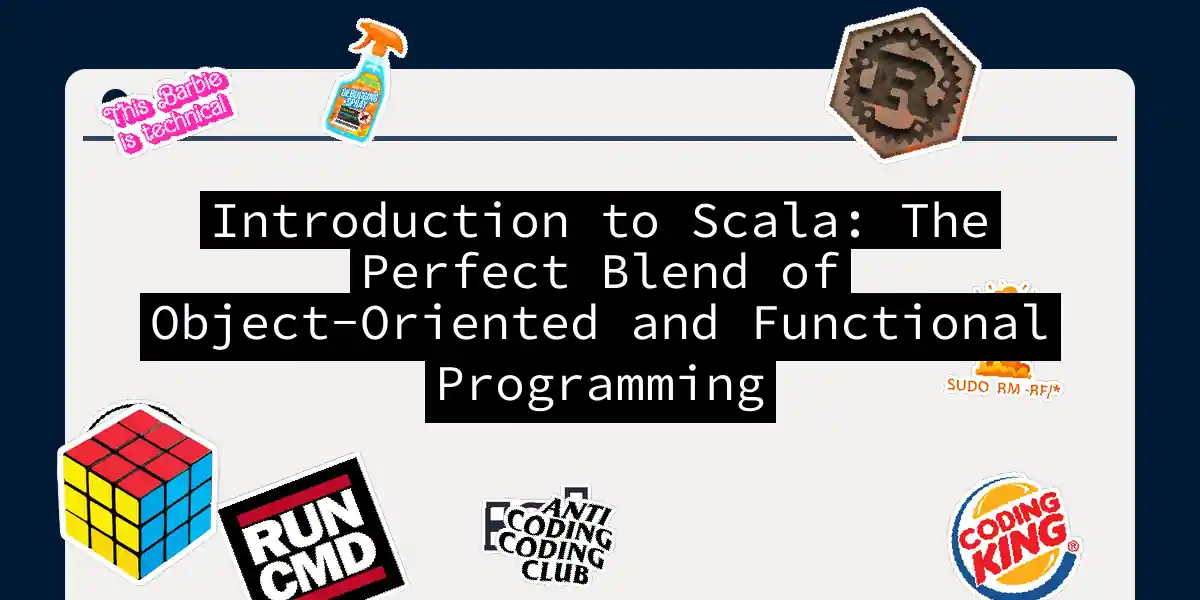Welcome to the World of Scala
If you’re a software developer looking to expand your toolkit with a language that seamlessly blends the best of both worlds – object-oriented and functional programming – then you’re in the right place. Scala, short for “Scalable Language,” is a modern, multi-paradigm language designed to make your coding life easier, more efficient, and downright enjoyable.
What is Scala?
Scala is more than just a language; it’s a philosophy. It’s about expressing common programming concepts in a simple, elegant, and type-safe manner. Imagine a world where you can write concise, expressive code that’s both functional and object-oriented. Sounds too good to be true? Well, buckle up, because Scala is here to make that dream a reality.
Object-Oriented Programming in Scala
Scala is a pure object-oriented language, meaning every value is an object. This might sound familiar if you’re coming from a Java background, but trust me, Scala takes it to the next level.
Classes and Objects
In Scala, classes are the building blocks of your program. They define the state and behavior of objects, and objects are instances of these classes. Here’s a simple example to get you started:
class Person(val name: String, val age: Int) {
def greet(): Unit = {
println(s"Hello, my name is $name and I am $age years old.")
}
}
val john = new Person("John", 30)
john.greet() // Output: Hello, my name is John and I am 30 years old.
Inheritance and Polymorphism
Scala supports inheritance, allowing you to create a hierarchy of classes and inherit properties and methods from parent classes. Polymorphism lets you use objects of different classes with the same interface. Here’s how you can do it:
class Animal {
def sound(): Unit
}
class Dog extends Animal {
override def sound(): Unit = {
println("Woof!")
}
}
class Cat extends Animal {
override def sound(): Unit = {
println("Meow!")
}
}
val dog: Animal = new Dog()
val cat: Animal = new Cat()
dog.sound() // Output: Woof!
cat.sound() // Output: Meow!
Traits
Traits in Scala are like interfaces in Java but with the added bonus of being able to add behavior to classes without changing their hierarchy. Here’s an example:
trait Printable {
def print(): Unit
}
class Document extends Printable {
override def print(): Unit = {
println("Printing a document...")
}
}
val doc = new Document()
doc.print() // Output: Printing a document...
Functional Programming in Scala
Now, let’s dive into the functional side of Scala. This is where things get really exciting.
Immutability
In functional programming, immutability is key. In Scala, data is immutable by default, which means it cannot be changed once created. This ensures safety and prevents side effects that can arise from changing data.
val myList = List(1, 2, 3)
// Trying to modify myList will result in a new list
val newList = myList :+ 4
println(myList) // Output: List(1, 2, 3)
println(newList) // Output: List(1, 2, 3, 4)
Higher-Order Functions
Functions in Scala are first-class citizens, meaning they can be assigned to variables, passed as arguments to other functions, and returned from functions. Here’s an example of a higher-order function:
def twice(f: Int => Int): Int => Int = {
x => f(f(x))
}
def addOne(x: Int): Int = x + 1
val result = twice(addOne)(5)
println(result) // Output: 7
Lambda Expressions
Lambda expressions are a concise way to define anonymous functions. Here’s how you can use them:
val double = (x: Int) => x * 2
println(double(5)) // Output: 10
Recursion
Recursion is another fundamental concept in functional programming. Here’s a simple example of a recursive function:
def factorial(n: Int): Int = {
if (n == 0) 1
else n * factorial(n - 1)
}
println(factorial(5)) // Output: 120
Combining Object-Oriented and Functional Programming
One of the most powerful aspects of Scala is its ability to seamlessly combine object-oriented and functional programming paradigms.
Example: Using Traits with Functional Programming
Here’s an example that combines traits with functional programming:
trait MathOps {
def add(x: Int, y: Int): Int
def multiply(x: Int, y: Int): Int
}
class FunctionalMath extends MathOps {
override def add(x: Int, y: Int): Int = x + y
override def multiply(x: Int, y: Int): Int = x * y
}
val mathOps = new FunctionalMath()
println(mathOps.add(3, 4)) // Output: 7
println(mathOps.multiply(3, 4)) // Output: 12
Control Structures and Operators
Scala provides all the standard control structures and operators you would expect from a programming language, including conditional expressions, loops, comparison operators, and logical operators.
Here’s an example of using conditional expressions and loops:
val x = 10
if (x > 5) {
println("x is greater than 5")
} else {
println("x is less than or equal to 5")
}
for (i <- 1 to 5) {
println(i)
}
Conclusion
Scala is more than just a language; it’s a way of thinking about programming. By combining the best of object-oriented and functional programming, Scala offers a powerful and flexible tool for software development. Whether you’re a seasoned developer or just starting out, Scala is definitely worth exploring.
So, what are you waiting for? Dive into the world of Scala and experience the joy of writing clean, efficient, and expressive code. Happy coding
